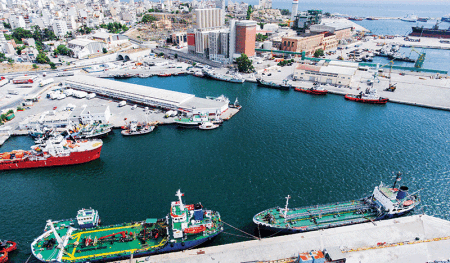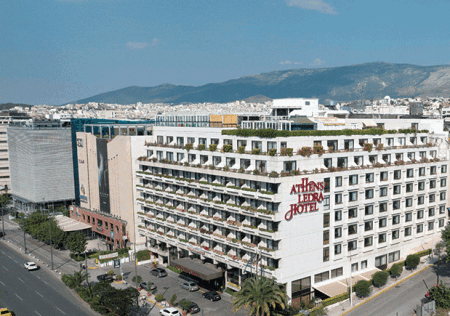At a time when the whole of Europe seems to be on the cusp of change, whether political, economic, social, or all of these, it seems incongruous that here in Greece we are striving for stabilization and normalization.
Following years of grinding austerity and attempted economic reforms, Greece undoubtedly remains bruised by the turmoil and trauma of the European debt crisis. European Union President Jean-Claude Juncker recently gave an upbeat prognosis in his annual State of the Union Address, proclaiming “the wind is back in Europe’s sails.”
While Greece has long been viewed as the Eurozone’s problem child, Juncker’s optimism about Europe overall has been reflected in some quarters regarding the country’s prospects. Despite Greece’s public debt remaining the highest in the European Union, standing at 177 percent of its gross domestic product (GDP), there are signs that the country is on the path to recovery, albeit still in the foothills.
After years of recession, Greece had GDP growth for the first time in 2014, and while it failed to sustain that growth due to political instability, now economists expected a modest 1.1 percent growth rate for 2017. This is substantiated by the recent S&P Global Rating, which upgraded its outlook on Greece’s sovereign credit rating from stable to positive. Furthermore, last summer the country returned to the capital markets with a €3 billion (US$3.5 billion) bond issue.
Unemployment figures, which still make for pretty bleak reading, are at least moving in the right direction. In July, the unemployment rate fell to 21 percent, the lowest since November 2011, and down 2.4 percentage points from the previous year. However, more than one-fifth of the country’s working-age adults are out of work.
Underpinning the cautious optimism is the Greek government’s ambitious privatization program, which after years of false dawns and delays, looks finally to be moving in the right direction, even if only at a modest pace.
With crisis seemingly tempered and stability being restored, Alexis Tsipras, Greece’s prime minister, is focusing on investments as the path to economic recovery. However, doubts remain as to whether the rest of his political machine has the motivation or ability to execute.
Major InvestmentsOne of the largest foreign investments is the acquisition of the Port of Piraeus—the main port of Athens—by Chinese shipping conglomerate Cosco. The proposed spectacular transformation of Piraeus into Europe’s biggest port is hoped to create thousands of jobs, revitalize the shipyards, pave the way for improved infrastructure and commercial workspace, and act as the catalyst for wider regeneration and growth.
Another key piece of the Athens regeneration jigsaw puzzle is the €8 billion (US$9.3 billion) private Hellinikon project, planned to redevelop 620 hectares (1,500 acres) on the coast on the former site of the Athens International Airport. The project is part of a series of privatizations and is expected to create about 70,000 jobs during the construction phase, plus 35,000 permanent positions.
About 200 hectares (490 acres) of the site will be transformed into a luxury resort with hotels, shopping centers, and apartments based in the heart of one of Europe’s biggest metropolitan parks.
After a series of postponements and opposition from a vociferous group of environmentalists and conservationists that added to the delays, the government is committed to pushing the project forward. Fosun, the Chinese conglomerate, and Al Maabar, a property company linked to Abu Dhabi’s sovereign wealth fund, have been reported as key investors in the project.
But the Hellinikon project in itself represents both sides of the Greek coin. The scale and ambition of the project are exciting, and the potential clearly exists for it to be the flag bearer for Greece’s recovery. However, the project has been mired in controversy and dogged by political infighting, so it also serves as an example of the difficulties that remain in the system.
Last fall, it was announced that Four Seasons Hotels and Resorts will be opening its first hotel in Greece, as the flagship hotel in the Astir Palace Resort, which is undergoing a renovation expected to cost about €100 million (US$118 million).
The hotel is situated on a 30-hectare (75 acre) peninsula 26 kilometers (16 mi) south of the city center of Athens, and will include a beachfront promenade, infinity pools, and an upgraded marina.
This past summer saw the grand opening of the eagerly anticipated Stavros Niarchos Cultural Centre in Athens. Designed by Italian architect Renzo Piano, the center is a new park, library, and theater complex—creating a new home for the National Library of Greece and the Greek National Opera—set amid a 170,000-square-meter (1.8 million sq ft) sloping park with a 400-meter-long (1,300 ft) rectangular lake.
With private sector investment backing the government’s ambition, the ultimate vision is to transform Athens into a vibrant, dynamic, and cosmopolitan global destination—perhaps using Barcelona as the model for urban regeneration in the way the Catalan capital was transformed from polluted industrial sprawl before the 1990s into one of the world’s most energetic and tourist-friendly cities.
It would not be disingenuous to draw parallels between the Barcelona of 1990 and the Athens of today. Both are port cities, steeped in history and heritage and boasting a sweeping but chronically understated waterfront.
Though the Greek government has been clear about its pro-investment stance, and there are encouraging signs pointing in the right direction, considerable disparity remains, at least in the eyes of investors and the outside world, between the vision and the rhetoric—and the reality. After all, Greece remains Europe’s weakest and most fallible economy.
The big question for the real estate market in Greece as it continues to pedal at the bottom of the cycle is just when an upturn can be expected. Extreme optimists in the market may point to Ireland as an example of what is possible. However, achieving rates of GDP growth comparable to those achieved by the Celtic Tiger would perhaps require intervention by the Greek gods! At the other end of the spectrum, many fear that without the economic fundamentals in place, the potential exists for another “lost decade.”
Opportunistic InvestorsDoes Greece represent a viable investment proposition for the institutional investment community in 2017? Not quite. However, the first intrigue and interest from the opportunistic investors is emerging. One thing is certain: it is those investors with the instinct to commit to Greece now, at the bottom of the market, who will be rewarded in the long term.
The sector seeing the most appetite from opportunistic investors is, unsurprisingly, hospitality. Tourism has held up well during the crisis and has grown dramatically in the past five years. Indeed, the country is expected to have welcomed a record 26 million vacationers in 2017, representing almost three times its population. The World Travel & Tourism Council estimates that tourism in 2017 will have helped boost the Greek economy by 6.9 percent and employment by 6.3 percent, supporting nearly 1 million jobs and representing 20 percent of the country’s GDP. One in five jobs in Greece is related to tourism.
One reason for tourism’s appeal is that it is linked more to the international economy rather than to the Greek economy. Another factor is the instability in competing holiday hot spots such as Turkey and Egypt, which many tour operators have abandoned.
Hines’s EntryAfter spending considerable time monitoring and exploring investment opportunities in the country, Hines entered the market last summer.
In a joint venture with Henderson Park, the European real estate investment platform, Hines acquired the former Ledra Marriott hotel in central Athens, one of the biggest and best known hotels in the city, for €33 million (US$38.5 million). The acquisition represented the first entry into the Greek market for both companies, and the commitment from two leading global real estate investment and asset management companies was seen as a milestone for the Greek market.
The hotel represents a fantastic repositioning opportunity, and Hines is looking forward to embarking on a major renovation of the hotel. Both Hines and Henderson Park have said they hope this transaction will be the precursor to further acquisitions in Greece.
In addition to hospitality propositions in Athens and major resort destinations in Greece, Hines is interested in the office and logistics sectors, and also very keen on retail space. Retail is a core and growing sector for Hines across Europe, and this focus extends to Greece. Though the country lags the rest of Europe in terms of both product quality and quantity, Greek shopping malls generally performed well throughout the crisis.
Following the lead of its counterparts across the continent, the alternative residential sector could be one Hines is interested in exploring. Student housing, in particular, is a growth area for Hines in the United Kingdom, Ireland, and other territories in Europe, and although Hines is a little way behind, this interest could be extended to Greece.
There is no doubt that Greece is a highly complicated and challenging market. Considerable and sometimes bewildering levels of bureaucracy and tax frameworks remain. It is a relatively small market where contacts, local intelligence, experience, and expertise count for a lot.
For these reasons, it remains an uncrowded market and one that the major development players, if not investors, have yet to tap into. Having that local intelligence is critical, and it is the reason why it would be foolhardy for an investor or developer to enter the market without a local partner.
In committing to Greece as a market, Hines knew it was imperative to have boots on the ground. Hines wears the hat of developer, investor, and asset manager, and its growing office in Athens gives the company that invaluable platform, putting it right in the heart of the market, in both a literal and metaphorical sense.
The Greek economy will continue to be under close scrutiny, and, no doubt, questions about the country’s ability to recover will remain. If the government can begin to back up its words with action and deliver on its promises, we might see investors’ heads turn toward the Acropolis.
Paul Gomopoulos, based in Athens, is a managing director at international real estate firm Hines, where he leads Hines Greece.






